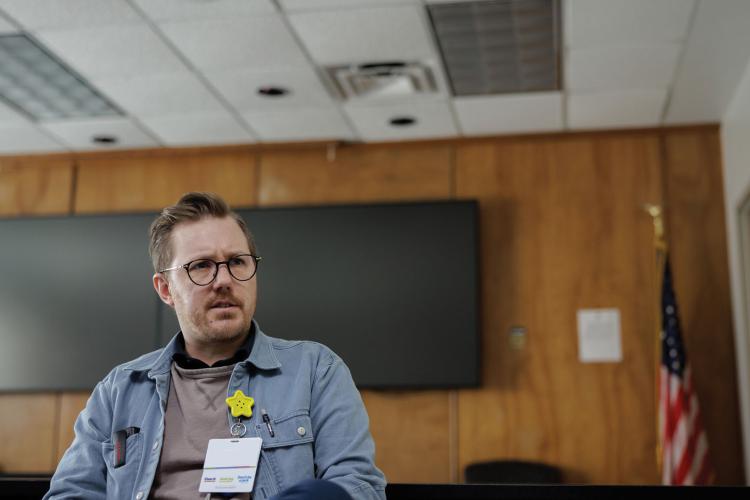
Nathan Langlitz, JPS Health Network Peer Support Specialist, knows what it means to find comfort in vulnerability. Langlitz spends time on the floors of Trinity Springs Pavilion, sharing his story about the behavioral health struggles he has lived through and what recovery looked like for him. He hopes that his story encourages others to feel a sense of camaraderie in the battle.
Suicidal ideation is a nondiscriminatory public health issue. A person of any background can be affected by these debilitating thoughts. Individuals may face an increased likelihood of occurrence depending on their environment, experiences, or relationship with controlled substances. However, it is essential to remember that people who are suicidal are not defined under one personality type.
"Music had always been my life. I wrote songs, played in bands, and traveled the world doing what I loved," Langlitz said. “But what I didn't realize was that the thing I loved so dearly was beginning to take a toll on my mental health."
Langlitz was the primary songwriter in his band, which meant it was his job to cultivate connections with the audience and maintain the authenticity of the band's missions. While he enjoyed the spotlight moments, the pressure quickly built and weighed on his mind.
"Though I have lost dreams in the past, I have rediscovered new ones. I'm still working on a novel and writing music. I'm three years sober and finding a way to turn my pain into hope for others."
Early into adulthood, an unagreeable publishing contract quickly erased all his career accomplishments and future goals. Langlitz found himself in a slump that he didn't have the motivation to get out of.
"I left New Orleans with no band, no money, and a case of depression. I didn't care about anything anymore. All I wanted to do was party," Langlitz said. The party lifestyle and diminished dreams caused Langlitz to spiral. Still, he found ways to write music, but alcohol had become such a significant issue that it directly affected his production capability. Slowly, Langlitz began feeling more and more isolated from the world.
In hopes of starting over, Langlitz moved to England to pursue a master's degree in creative writing. Though he completed schooling with distinguished honors, his life outside of academics was still reckless.
"All I was worried about was dulling my thoughts. I fell deeper into depression, and my only way out was to find a vice. Along with the drinking and partying, I started taking drugs," Langlitz said. "I was so worried about chasing the high that I missed my job sponsorship, which meant I had to leave London." As more dreams seemed to disappear, Langlitz began facing feelings of defeat, failure, and loneliness. He had gotten to a point where he was too scared to try anything new because he assumed he would fail again. So, he sat consumed in apathy.
Impacted by these emotions, Langlitz found himself in an extreme mental crisis. Thankfully, he had kept friends close enough to him that help was quickly on the way.
"After I got out of the hospital, it only took a month for me to return to living the life I had been before. Shortly after, I was arrested for DWI – I swore that this time would be it and I'd learn my lesson, but it wasn't," said Langlitz.
Langlitz went on to battle alcoholism, depression, and instability for some time afterward. In April of 2021, Langlitz decided it was time to change his life for good. It was time to prioritize his wife, their children, and his faith.
"I've reconnected with and found the true foundation of my faith. I have found someone who helps hold me accountable for my daily actions. I've learned to open myself up to failure and swallow my perfectionism," Langlitz said. "Though I have lost dreams in the past, I have rediscovered new ones. I'm still working on a novel and writing music. I'm three years sober and finding a way to turn my pain into hope for others."
It is critical to know how substance misuse can impact suicidal ideation because the individual must be ready and willing to accept help before therapy begins to stick. Until then, building people up in community and support is perhaps the most essential portion of their recovery.
"For us, the people going through these struggles, we have to make the decision to accept our hardships and turn pain into our platform," Langlitz said. “In the meantime, letting people know that they are not alone is crucial. These thoughts are beastly, and alienation is common, but that feeling of loneliness only makes this worse. Even if they aren't ready for change, they are still people who deserve support."
Being aware of the signs of suicidal ideation can help prevent individuals from taking action on those thoughts. Talking about the topic makes it a destigmatized conversation and encourages others to seek help.
"Mental illness has no face. If there's anyone out there, regardless of your background or experiences, feeling this way, know there's always going to be help. So, reach out. We're here for you," said Jennifer Burgess, Manager, Behavioral Health Transition
If you or someone you may know are experiencing signs of suicidal ideation or need access to resources, visit the JPS Behavioral Health page to connect to care.
